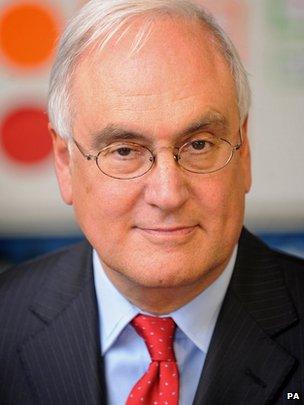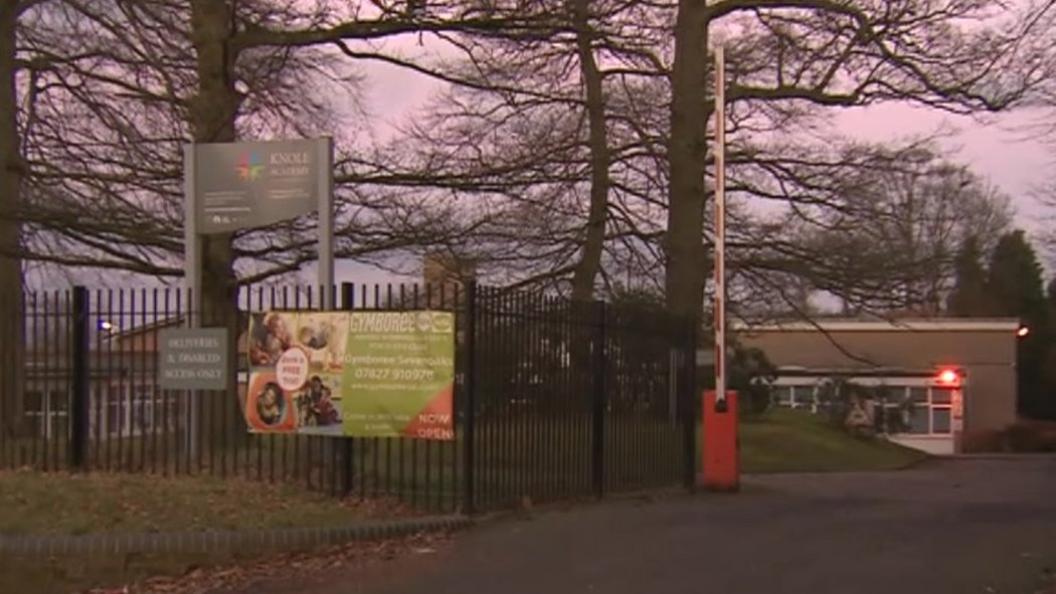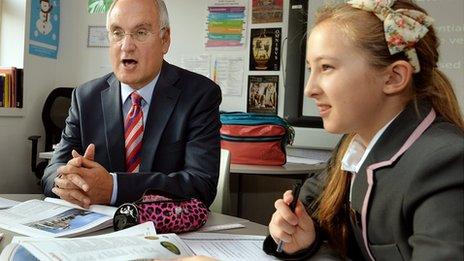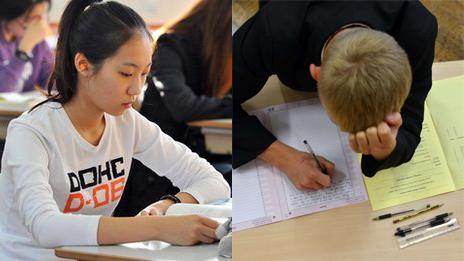Grammar schools don't boost social mobility, Ofsted chief says
- Published
- comments

Sir Michael said he thought school summer holidays were too long
Grammar schools are "stuffed full" of middle-class children and do not improve social mobility, the chief inspector of schools in England says.
Sir Michael Wilshaw told the Observer, external the selective system was not the way to make up ground on other nations.
He spoke after plans to expand grammar school provision in Kent were rejected.
But Tory MP and former grammar school pupil David Davis told BBC News many working-class children "got on through having access to grammar schools".
He said: "The reason grammar schools are dominated by the middle classes now is because we've shrunk the size of the sector."
He added that "working-class kids" could not get in "because they've been elbowed out by ambitious middle class parents".
Falling behind
Sir Michael told the Observer newspaper: "Grammar schools are stuffed full of middle-class kids. A tiny percentage are on free school meals: 3%. That is a nonsense.
"Anyone who thinks grammar schools are going to increase social mobility needs to look at those figures. I don't think they work."

Sir Michael Wilshaw said parents should contact Ofsted when schools have serious failings
Results of the OECD's global Pisa tests recently showed that the UK is falling behind global rivals, with British 15-year-olds ranked 26th in maths, 23rd for reading and in 21st place in science.
But Sir Michael said he did not think the selective system was the way to make up ground on other nations.
"Northern Ireland has a selective system and they did worse than us in the (international comparison) table," said the Ofsted chief.
"The grammar schools might do well with 10% of the school population, but everyone else does really badly.
"What we have to do is make sure all schools do well in the areas in which they are located."
Influx 'concerns'
Weald of Kent Grammar School and Invicta Grammar School both put in rival bids to run an annexe in Sevenoaks to address a shortage of selective places.
Both were rejected by the Department for Education on Friday because neither complied with the law, which allows for the expansion of grammar schools but not the creation of new ones.
In the wide-ranging interview, Sir Michael also said that he thought the six-week summer holiday was "too long" when asked if teachers have too many holidays.
And he said he had "concerns" about the potential influx of Romanian and Bulgarian children when people from the eastern European countries gain the same rights to work in the UK as other EU citizens on 1 January.
"If we get huge numbers of children from overseas and from eastern Europe coming in, we have to have enough teachers to teach them and resources available in schools," he said.
Fiona Millar, from the group Comprehensive Future, which campaigns against selective education, said Sir Michael was right to highlight the divide, arguing that poorer pupils struggle to pass the entrance exam for grammar schools.
Speaking to BBC Radio 4's The World This Weekend programme, she said: "The problem is that doing the tests is accompanied by a very expensive private tuition industry. Everybody knows that.
"The affluent parents can work that system very, very well. There's really no way to create a tutor-proof test so while you've got entry by selective test, it is going to benefit the better-off families - and that is why Michael Wilshaw is right to say that it is not a system for the future of this country if what we want is all children to do well and the gaps to narrow."
But Conservative MP Graham Brady , who resigned as a party spokesman in protest at David Cameron's opposition to new grammar schools, said there are "still a lot of very bad schools" in the country, which Sir Michael would do better to focus on.
Also speaking to The World This Weekend, he said: "The key point here is there is a problem in getting levels of attainment amongst people from less privileged background, particularly in the primary sector, which is feeing into the secondary. So the grammar schools aren't themselves discriminated in any way."
- Published13 December 2013

- Published11 December 2013

- Published3 December 2013
